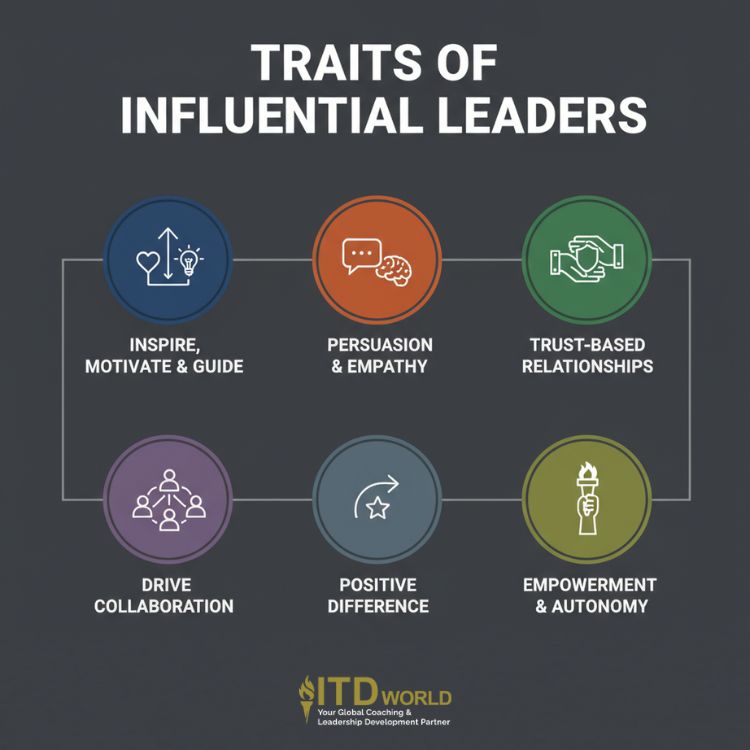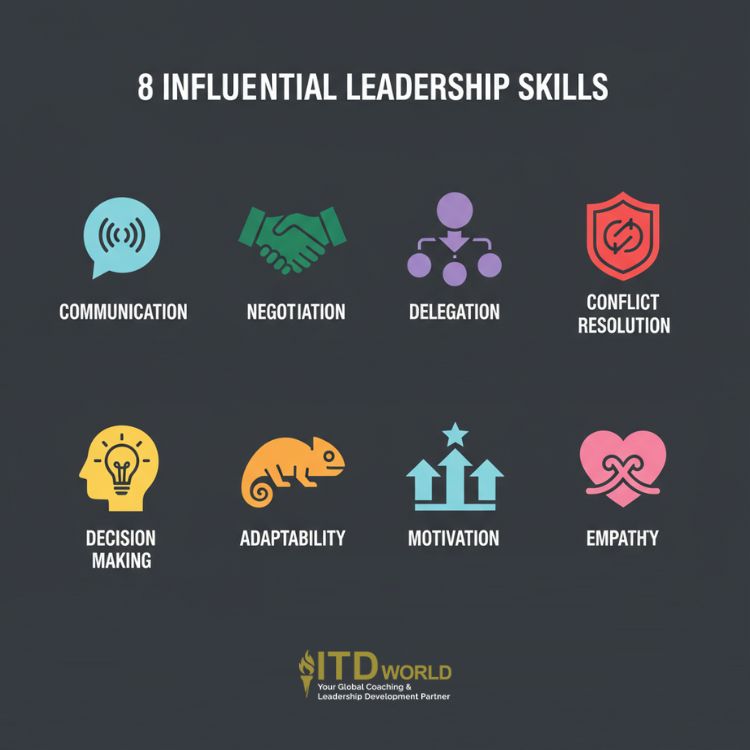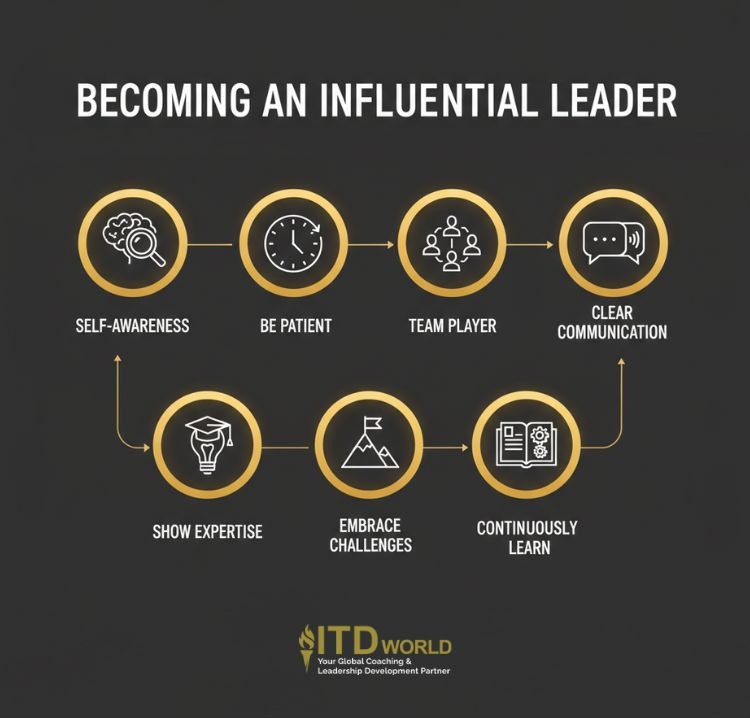Holding a title is nice, but not when it comes to leadership. In today’s dynamic and ever-evolving world, effective leadership has transcended traditional hierarchies and authority. Instead, it is characterized by the ability to inspire, guide, and empower others to achieve collective success – in other words, the practice of influential leadership.
|
Author: Aaron Ngui |
Highlights
- Influential leadership is a management style that focuses on building strong relationships, empowering others, and fostering open communication to achieve shared goals. It is great for fostering trust, empathy, effective communication, collaboration, and adaptability, ultimately leading to more productive and innovative teams.
- In order to adopt such an approach, one needs to demonstrate skills such as communication, negotiation, delegation, conflict resolution, decision-making, adaptability, motivation, and empathy.
- Leaders influence others by recognizing their achievements, fostering a positive work environment, setting clear goals, providing feedback, leading by example, and embracing diversity and inclusion. They need to develop self-awareness, be patient, be a team player, communicate clearly, demonstrate expertise, embrace challenges, and continuously learn and develop.
- Aspiring influential leaders should avoid being overly aggressive, micromanaging, ignoring people, and playing favorites.
What is Influential Leadership?
Influential leadership is about leading others by tapping on the power of influence. Instead of using authority to get things done, those who adopt this style influence others positively so they can excel and collaborate better with each other.
Below are a few common key concepts when it comes to influential leadership theory:
- Leader-follower relationship: Rather than control or domination, the focus is on building strong relationships with followers. Effective leaders understand their people’s needs, aspirations, and concerns – based on which they make use of their influence to facilitate others’ success.
- Motivation and inspiration: Influential leaders are able to inspire others to realize and unlock their full potential. They create a shared vision and empower their followers to take ownership of their work.
- Empowerment and delegation: Instead of trying to do everything themselves; they empower others to make decisions and take action.
- Communication and empathy: They are able to communicate their vision clearly, listen actively, and show empathy for their followers’ perspectives.
- Adaptability and flexibility: They are open to new ideas and willing to change their approach when necessary.
What Makes a Leader Influential?
Here’s a breakdown of the key characteristics of influential leaders:
- Inspire, motivate, and guide: They positively direct their team rather than resorting to a command-and-control style.
- Leverage persuasion and empathy: They make use of their own soft skills to better relate to the needs and aspirations of others.
- Establish trust & foster relationships: Their approach helps cultivate strong bonds, which are essential for collaboration.
- Drive performance: The result of strong relationships and trust is improved teamwork and output.
- Make a positive difference: Instead of forcing compliance, influential leaders focus on improving the lives and work experiences of the people around them.
- Empowerment & autonomy: They provide training and support while giving team members more freedom in how they achieve goals.
The positive outcome of this management style is a workforce that feels more engaged, successful, and empowered.

Example:
A company is struggling to meet its sales goals. The manager, who is known for his command-and-control style of leadership, decides to implement a new policy that requires salespeople to make a certain number of cold calls per day. The salespeople resent the new policy and their morale plummets. As a result, sales continue to decline.
A new manager is hired who takes a different approach. He listens to the salespeople’s concerns and learns that they are feeling overwhelmed and unsupported. He then implements a new program that provides team members with training and support on how to make effective calls – as well as gives them more autonomy in how they reach their sales goals.
As a result, people feel more empowered, engaged, and more successful in their efforts – which allows sales to start increasing.
Why is Influential Leadership Crucial?
The key to successful leadership today is influence, not authority.
Ken Blanchard
Influential leadership is not about authoritarian approaches. Instead, the power of interpersonal skills is harnessed to make things happen. As such, this management style brings about a great deal of benefits, including:
-
Building trust
Influential leaders are adept at creating trust. Trust is the foundation upon which influential leadership is built, and it forms the basis of productive working relationships. -
Empathy
Understanding the emotions, perspectives, and needs of others is a vital element when it comes to this type of leadership. Connecting at a deeper level enables us to touch hearts with care and sincerity to address individual concerns more effectively. -
Effective communication
Influential leaders are excellent communicators. They convey the vision and expectations clearly while staying open to feedback and suggestions. -
Lead by example
Leading by example is another hallmark of influential leadership. By practicing what they preach, one becomes a role model for others to follow and align with the values and behaviours they promote. -
Collaborative approach
Encouraging collaboration and appreciating diverse perspectives fosters an environment where people feel valued and empowered. This strengthens team cohesion – which maximizes the possibilities for teams to jump the S-Curve for innovative solutions. -
Adaptability
Influential leaders navigate uncertainty and difficulties with grace. They embrace the challenges of change and encourage their teams to do the same.

Influential Leadership Skills
Influential leadership skills are the abilities and qualities that enable leaders to inspire and motivate others to achieve common goals and create positive change. For those who would like to follow this management style, some of the most essential characteristics to nurture include:
-
Communication
As the bedrock of influential leadership, effective communication goes beyond words; it encompasses active listening, understanding nonverbal cues, mastering presentation skills, and commanding public speaking. By conveying their ideas clearly, persuasively, and empathetically, leaders establish trust, build rapport, and articulate their vision, goals, and expectations.
Furthermore, skillful communication enables them to provide constructive feedback, mediate conflicts, and negotiate solutions, fostering an environment where ideas and concerns can be openly shared and addressed.
-
Negotiation
Effective leaders possess the art of finding mutually agreeable solutions in situations involving multiple stakeholders. They skillfully balance their objectives with the needs and desires of others, all while nurturing positive relationships.
Negotiation skills not only promote fairness and cooperation – but also guide them in handling disagreements constructively. The ability to understand the interests of all parties, explore options, propose solutions, and ultimately reach agreements fosters a collaborative atmosphere where everyone feels heard and valued.
Read more: Stakeholder Management – A Leader’s Engagement Playbook
-
Delegation
Influential leaders recognize the power of delegation. They entrust their team members with tasks and responsibilities, giving them the autonomy to excel in their roles. This bolsters trust and allows them to focus on higher-level priorities, ensuring that the entire team aligns with common goals.
Delegation is a testament to a leader’s confidence in their team’s abilities, which, in turn, motivates team members to demonstrate their capabilities and dedication.
-
Conflict resolution
Conflict is an inevitable facet of any dynamic workplace. Influential leaders excel in managing and resolving disputes constructively. They possess the knack for identifying the root causes of disagreements, listening empathetically to all parties involved, expressing their feelings and needs transparently, and ultimately discovering common ground.
-
Decision-making
Effective leaders are adept decision-makers, especially in high-pressure situations. They excel in gathering relevant information, evaluating different options, and making choices that align with the best interests of their team or organization. These decisions, grounded in a deep understanding of the situation and a focus on long-term goals, guide the team toward success and growth.
-
Adaptability
In an ever-changing landscape, adaptability has become a prized leadership skill. Influential leaders swiftly adjust their behavior and actions in response to evolving circumstances. Such flexibility helps them navigate uncertainty, complexity, and ambiguity, and even seize opportunities and overcome challenges.
Key attributes of adaptability include resilience, flexibility, creativity, and learning agility.
Read more: Agility Coaching – Navigating Change & Fueling Business Success
-
Motivation
Leaders with influential leadership skills master the art of motivation. They inspire and encourage team members to perform at their best, creating a positive and productive work environment. By setting clear and realistic goals, providing recognition and rewards, giving constructive feedback, and empowering their team members, they foster a sense of purpose, direction, and commitment, ensuring that every member of the team is motivated to achieve their individual and collective objectives.
-
Empathy
Empathy is the linchpin of influential leadership. By putting oneself in others’ shoes and seeing things from their perspective, one is better equipped to build strong and lasting relationships. This ability to connect with team members on a personal level is instrumental in motivating them to perform at their best and fostering a harmonious and collaborative work environment.

How Do Leaders Influence Others?
The challenge of leadership is to be strong, but not rude; be kind, but not weak; be bold, but not a bully; be thoughtful, but not lazy; be humble, but not timid; be proud, but not arrogant; have humour but without folly.
Jim Rohn
Leaders influence others in a variety of ways – some of the most common and effective methods include:
- Empowering others: Empowerment entails giving team members the autonomy and resources they need to perform their roles effectively. By allowing team members to take ownership of their tasks, one fosters an environment of innovation and self-reliance.
- Recognizing & rewarding achievements: People are more inclined to repeat behaviors that receive acknowledgment and appreciation. As such, leaders should routinely acknowledge accomplishments, both large and small, through formal recognition programs, informal praise, or simple gestures of appreciation.
- Fostering a positive & inclusive work environment: A positive work environment is one where individuals feel respected, valued, and at ease. Leaders contribute to such an atmosphere by being approachable, encouraging collaboration, and addressing issues promptly and fairly.
- Setting clear goals & expectations: Clear, well-defined goals provide direction and motivation for team members. Leaders should establish objectives that are challenging yet attainable and communicate them effectively. Clarity in expectations empowers team members to focus their efforts and align their work with the broader mission.
- Providing feedback and coaching: Constructive feedback is crucial for personal growth and development. Leaders should offer regular feedback, both positive and constructive, to facilitate continuous improvement among their team members. Additionally, they should be willing to coach and mentor others to reach their full potential and refine their skills.
- Setting an example: One cannot expect their team members to follow their directives if they themselves fail to adhere to their own standards. Setting a high standard for their own conduct and being accountable for their actions sets a powerful precedent. People are more likely to respect and emulate those who practice what they preach.
- Embracing diversity & inclusion: A commitment to diversity and inclusion is central to modern leadership. Leaders should foster a workplace that welcomes and values individuals from all backgrounds. This involves recognizing and addressing one’s own biases, creating an inclusive culture, and ensuring that all team members feel seen, heard, and appreciated for their unique contributions.
Read more: Weak Leadership – How Bad Leaders Undermine Success

How Can I Develop Influential Leadership?
Here are some coaching questions to think about, and reflect on to develop influential leadership capabilities.
- Self-reflection: What can I do better to be authentic, transparent, and consistent in my actions?
- Empathy: What steps can I take to enhance my empathy skills?
- Communication: How can I communicate more effectively with others?
- Leading by example: What can I do to role model the values and behaviours for others to follow?
- Collaboration: What can I do to enhance collaboration and cohesion in my team?
- Adaptability: How do I navigate change and uncertainty effectively?
Influential leadership is a powerful approach to transforming a directive leadership style into an inspiring one. When focusing on building trust, empathy, communication, leading by example, collaboration, and adaptability, one is equipped to make a positive difference in the lives of the people they lead. Those who nurture influential leadership skills are in a good position to excel in their professional journey.
A leader is one who knows the way, goes the way, and shows the way.
Strategies for Becoming an Influential Leader – Best Practices
Here are some tips and methods to help you improve your influence as a leader:
- Develop self-awareness
To truly inspire and guide others, you must first understand yourself. This means recognizing your strengths, weaknesses, values, and motivations.
Self-reflection, feedback from peers, and personality assessments can be invaluable tools for gaining self-awareness. By comprehending how your actions and behaviors impact others, you can tailor your approach to elicit the desired response and build more meaningful relationships with your team.
- Be patient
Influential leadership is a journey that often requires time and patience. Building relationships, credibility, and reputation with your team and stakeholders doesn’t happen overnight. Along the way, you may encounter challenges, setbacks, and resistance. Patience allows you to demonstrate your perseverance, resilience, and optimism, inspiring your team to exhibit the same qualities.
- Be a team player
A true leader recognizes the value of collaboration and cooperation. Being a team player entails actively engaging with your team members, appreciating their contributions, and respecting their opinions. You should willingly share your knowledge, skills, and resources, fostering an environment of mutual learning and development.
- Communicate with clarity and purpose
Clear and concise communication ensures that your message is understood by all. Adapt your communication style to your audience, ensuring that you convey your message in a way that resonates with each individual. The use of storytelling, visuals, and real-life examples can significantly make your messages more engaging and impactful, leaving a lasting impression on your team.
- Show your expertise
To inspire confidence and trust in your leadership, you must demonstrate your knowledge, skills, and experience in your field. Provide valuable insights, solutions, and guidance to your team based on your expertise. Stay informed about the latest industry trends, developments, and best practices.
- Embrace challenges
Challenges are not roadblocks but opportunities for growth and development. By facing them head-on and encouraging your team to do the same, you essentially contribute to creating a culture of courage and continuous improvement.
- Continuously learn and develop
Influential leaders are lifelong learners. They understand that leadership is an ever-evolving journey. To stay at the forefront, seek out new knowledge and skills that enhance your leadership abilities. Attend workshops, read books, and engage in mentorship to foster personal and professional growth.
Your commitment to self-improvement serves as a model for your team, encouraging them to adopt a similar mindset.
Read more: Self Leadership – The Art of Leading from Within

Common Mistakes that Aspiring Influential Leaders Should Avoid
- Being overly aggressive in exerting influence: It is a common misconception – especially among new managers – that leaders need to assert their authority. While that may be true, an overly aggressive approach often brings about counterproductive effects. Excessive forcefulness is what alienates team members, breeds resistance, and erodes trust. Under all circumstances, one should strive to strike a balance between assertiveness and receptivity – so as to foster collaboration and maintain trust.
- Micromanaging: Micromanagement, often driven by a lack of trust or the desire for control, is detrimental to a team’s performance. It stifles creativity, disempowers team members, and undermines their confidence. Instead, leaders should provide clear guidance, set expectations, and then empower others to take ownership of their tasks.
- Ignoring people: Ignoring team members manifests itself in various ways, including inadequate/ unclear communication, inconsistency, insensitivity, avoiding conflict resolution, and failing to invest time in coaching & development. For those aspiring to become effective leaders, make sure to actively engage with others – and ensure that messages are clear, consistent, and sensitive to the needs of each individual. Addressing conflicts and providing regular team coaching is crucial for nurturing growth and building up a positive work environment.
- Playing favorites: Favoritism in leadership, where certain team members receive preferential treatment, results in division and resentment within the team. Leaders must maintain fairness and objectivity in their decision-making processes, by recognizing and rewarding team members based on merit and contribution.
Read more: 7 Leadership Mistakes to Avoid – From Failure to Success

Who are Some Influential Leaders?
Below are a few examples of well-known people in history who have demonstrated great influence in leadership positions around the world.
-
Nelson Mandela
The former South African president exemplified this concept through his dedication to ending apartheid peacefully. His unwavering commitment to reconciliation and forgiveness inspired his nation and the world. -
Ginni Rometty
The former chairman, president, and CEO of IBM, demonstrated influential leadership in the technology sector. She focused on artificial intelligence, cloud computing, and data analytics during her tenure. -
Ratan Tata
The former chairman of the Tata Group is known for his influence on India’s business landscape. Under his guidance, the Tata Group expanded globally and prioritized social responsibility. -
Warren Buffett
The chairman and CEO of Berkshire Hathaway is a well-known influential leader in the world of finance and investment. His value investing philosophy and philanthropic efforts have had a significant impact on the world. -
Oprah Winfrey
The media mogul and philanthropist’s influential leadership is evident in her ability to connect with her audience and inspire change. Her empathy and authenticity have earned her a loyal following and a substantial positive impact.
Influential Leadership Quotes
Check out more quotes about persuasion & influence here!
There is only one way under high heaven to get anybody to do anything – and that is by making the other person wants to do it.
Dale Carnegie
The most powerful person in the world is the story teller. The storyteller sets the vision, values and agenda of an entire generation that is to come.
Steve Jobs
The most common way people give up their power is by thinking they don’t have any.
Alice Walker
The ultimate measure of a man is not where he stands in moments of comfort and convenience, but where he stands at times of challenge and controversy.
Martin Luther King Jr.
Be the change that you wish to see in the world.
Mahatma Gandhi
I’ve learned that people will forget what you said, people will forget what you did, but people will never forget how you made them feel.
Maya Angelou
Leadership is not about a title or a designation. It’s about impact, influence and inspiration. Impact involves getting results, influence is about spreading the passion you have for your work, and you have to inspire team-mates and customers.
Robin S. Sharma
Influential Leadership Books
- “Leadership in Turbulent Times” by Doris Kearns Goodwin: Goodwin’s book delves into the extraordinary leadership qualities and practices of four iconic U.S. presidents—Abraham Lincoln, Theodore Roosevelt, Franklin D. Roosevelt, and Lyndon B. Johnson. It examines how they faced and overcame monumental challenges and crises, revealing the development of their vision, courage, empathy, resilience, and moral purpose.
- “How the Mighty Fall” by Jim Collins: In this thought-provoking work, Jim Collins explores the patterns and pitfalls that lead great companies and organizations to decline and ultimately fail. Collins identifies five stages of decline, from hubris and denial to capitulation and dissolution. By studying these stages, readers gain critical insights into recognizing the warning signs of decline and practical advice on how to either avoid or reverse the process, emphasizing the importance of vigilance and adaptability in leadership.
- “Dare to Lead” by Brené Brown: Brené Brown challenges conventional notions of leadership and argues that true leadership hinges on the courage to be vulnerable, authentic, and empathetic. She provides research-based tools and strategies to help leaders cultivate a culture of trust, open communication, and accountability in the workplace.
- “The Five Levels of Leadership” by John C. Maxwell: Maxwell’s book outlines a clear path to leadership development through five distinct levels: position, permission, production, people development, and pinnacle. He offers practical guidance on mastering each level, emphasizing the importance of empowering others to become leaders themselves.
- “The 7 Habits of Highly Effective People” by Stephen R. Covey: Covey’s classic work is a cornerstone of leadership literature. It presents a holistic and principle-centered approach to achieving personal and professional success. The book outlines seven habits that can guide leaders to set and achieve their goals, such as proactivity, beginning with the end in mind, prioritizing tasks, and practicing empathetic communication.
How Can ITD World Help with Influential Leadership Training?
As the Global Coaching and Leadership Development Partner, we at ITD World offer comprehensive programs to develop influential leadership skills. Our approach focuses on inspiring, motivating, and empowering others to achieve common goals. As such, ITD’s solutions are designed to provide knowledge, skills, and a holistic approach to leadership.
Key offerings:
- Personalized leadership assessment
- Expert coaching and mentoring
- Engaging, practical workshops
- Customized organizational training
- Impact measurement for continuous improvement
Contact ITD World today for a FREE consultation!
Other resources you might be interested in:
- Situational Leadership: A Guide for Effective Strategies
- Leadership Values: 10 Qualities for Exceptional Results
- Leadership Branding: Crafting an Inspiring Personal Identity
- Leadership Excellence: Moving From Manager to Multiplier
- Skill Development: A Guide to Future-Proofing Yourself

